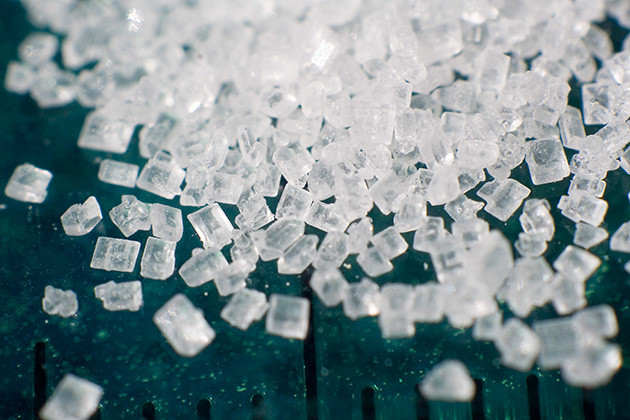Does the sugar used to make candies and apricot in Vietnam cause cancer?
Saccharin and cyclamate are sweeteners, chemical sugars allowed for use in food and often used in the processing of confectionery, apricot, tea cooking in our country. But abusing too much chemical sugar is very harmful to human health. Find out about these two artificial sweeteners through the article below.
Saccarin and Cyclamate have been banned in the US in the 1970s because of cancer in mice. However, these bans have now been lifted because there is no evidence that affects people of this kind.
Capital is the substance used in the food processing industry, drinks, often used in Vietnam in confectionery products, tea, soft drinks, . Sugar chemistry Saccharin and cyclamate affect health how?
America has warned about the chemical route since the 70s
According to the US National Cancer Institute (NIH), Saccharin and Cyclamate are sweeteners, also known as chemical sugars, and are used quite commonly in food and beverages. These substances are many times sweeter than sugar so a small amount of sugar can produce the same sweetness compared to the large sugar.
Saccharin was created in 1879 by Constantin Fahlberg, a scientist at Johns Hopkins University, has 300 times sweeter taste than sugar and has no calories . Saccharin quickly became popular and was used in food and beverage production during World War 1 and 2.

Saccharin tastes 300 times sweeter than sugar and has no calories.
Cyclamate appeared on the market in 1959, sweet 30-50 times the sugar. Food and beverage companies use Cyclamate to make their products taste more natural than saccharin as before.
However, in the 1960s, scientific studies found an association between cyclamate and cancer. Which indicates that the chicken embryos injected with this chemical develop malformations that raise concerns about similar effects with humans. Another study showed that sweeteners are linked to bladder malignancies in mice.Therefore, since 1969, the US Government has ordered to remove cyclamate from all foods.
For Saccharin, studies from the early 1970s showed a link between this substance and bladder cancer in laboratory mice. For this reason, the US government is required to conduct follow-up studies on saccharin and require that all foods containing this substance be labeled with warning: "Use of this product may be dangerous to Your health This product contains saccharin, which has been found to cause cancer in laboratory animals ".
But it was lifted because there was no evidence to influence people
Later studies in mice showed an increased incidence of bladder cancer using high dose saccharin , especially in male rats. However, studies have shown that these results only apply to mice. Other animals like monkeys and guinea pigs (Guinea Pig) showed no evidence between saccharin and bladder cancer and no mechanism, clear evidence that saccharin causes cancer in humans. By 2000, warning labels on products containing saccharin were canceled.
With cyclamate, FDA banned the use of this substance in 1969 due to bladder cancer findings in saccharin-like mice. However, after re-researching cyclamate and quantifying the amount of use, the scientists said that this is not a carcinogenic or co-carcinogenic substance (increased effect when combining the same carcinogen. letter).

Cyclamate appeared on the market in 1959, 30-50 times sweeter than sugar.
A petition submitted to FDA for re-approval of cyclamate, but has not been reviewed yet. FDA concerns about cyclamate are not related to cancer.
Over the past 10 years, many new artificial sweeteners have been found, such as acesulfame potassium (ACK, Sweet One®, Sunett®), sucralose (Splenda®), and neotame (Newtame®) and become popular. But before these substances were approved by FDA, the agency conducted more than 100 safety studies on each substance. According to the US National Cancer Institute, the results of these studies show no evidence of sweeteners causing cancer or causing any other threat to human health.
The FDA also stated that the allowable limit for sweetener additives for each person to consume does not cause side effects of 50mg / kg body weight. This means that a 60kg person can consume 3000 mg of aspartame per day, which is equivalent to about 16 12 ounce diet soda bottles (about 355ml).
- Mai hoa dang - beautiful flower that causes 'fever' in Vietnam
- For the first time, implant successful cancer treatment beads in Vietnam
- Summer cooling with the apricot fruit
- The man poisoned cyanide by self-curing cancer with apricot seeds
- Cancer will increase strongly in Vietnam in the next 5 years
- Instructions on how to take care of apricot flowers after Tet
- How to choose beautiful apricot flowers, many fortune to welcome Tet
- Experience for the right apricot blossom for Tet
- Chemical sugar can be used to treat cancer
- The way of distinguishing the sugar from the chemical way
- Do you know that fecal sugar is so diverse and the effect on the body is different?
- Equally hazardous road cigarettes?
 Green tea cleans teeth better than mouthwash?
Green tea cleans teeth better than mouthwash? Death kiss: This is why you should not let anyone kiss your baby's lips
Death kiss: This is why you should not let anyone kiss your baby's lips What is salmonellosis?
What is salmonellosis? Caution should be exercised when using aloe vera through eating and drinking
Caution should be exercised when using aloe vera through eating and drinking